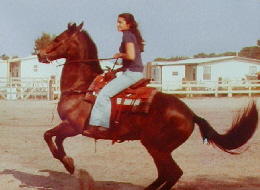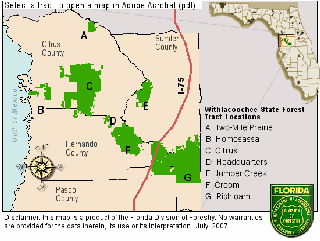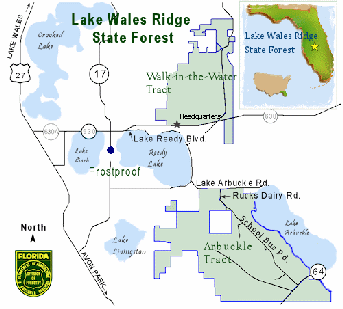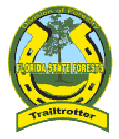|
Take a Horseback Tour of Florida's State Forests
As a matter of fact, a weekend vacation with a horse will, in effect, be an informal, effective trail riding lesson for both
horse and rider. Your mount will learn to depend on you for his daily care and feed, and you will develop a deeper sense of responsibility looking out for both of you.
Every state has locations suited for horseback riding, and Florida is no exception. There are many
secluded trails where you can explore some of the most beautiful and unspoiled wilderness areas. The
state, often better known for its beaches, also provides the unique wildlife and natural surroundings of a
semi-tropical peninsula. The abundance of forest vegetation, numerous flowing creeks and spring-fed
rivers, and the mild winters make a horseback vacation a perfect choice for outdoors lovers.
The Blackwater River State Forest
This 183,000-acre forest is the largest in Florida, and is located only a few miles north of Pensacola, near I
-10 and I-65. It is a most enjoyable wilderness area in which to spend a few days with your horse.
 The Coldwater Horse Trails within the forest cover some of the largest remaining stands of long leaf pine forests in America.
Abundant wildlife depends on this habitat. Wild pigs, bobcats, beavers and otters leave their tracks along shallow, sand-bottom streams. The Coldwater Horse Trails within the forest cover some of the largest remaining stands of long leaf pine forests in America.
Abundant wildlife depends on this habitat. Wild pigs, bobcats, beavers and otters leave their tracks along shallow, sand-bottom streams.
More than seven miles of trails criss cross throughout 6,500 acres full of fragrant juniper trees magnolias, dogwoods, red
maples, and giant pines. In late spring and early summer, bushes of wild blueberries and blackberries are ready for the picking. In the fall, the hardwoods display their bright, orange
-hued leaves, making it hard for you to keep your eyes on the trail. Whoever said Florida did not have an autumn has not been to the Blackwater River State Forest.
Several of the horse trails also cross the Old Spanish Trail Road. Legend has it this was the ancient route
taken by many Spanish conquistadors on their explorations in search of treasure. And, unlike many of
other horse trails in Florida, hunting is not allowed within the Coldwater horse trails, therefore, they are open throughout the year.
Withlacoochee State Forest
 The Withlacoochee State Forest is just 60 miles from either Tampa or Orlando and it's an excellent destination for an extended horseback camping
vacation. Peace and tranquility are the rule in this wilderness area. When there are few campers (as is usually the case), the raccoons, deer, and fox can be
seen wandering through the almost deserted grounds, peering curiously back at any human intruders. Birds of prey, such as osprey, hawks, and owls, inhabit the trees which surround the
campground. The Withlacoochee State Forest is just 60 miles from either Tampa or Orlando and it's an excellent destination for an extended horseback camping
vacation. Peace and tranquility are the rule in this wilderness area. When there are few campers (as is usually the case), the raccoons, deer, and fox can be
seen wandering through the almost deserted grounds, peering curiously back at any human intruders. Birds of prey, such as osprey, hawks, and owls, inhabit the trees which surround the
campground.
The stables have excellent stalls, with a corral also available. The campsites are furnished with fire rings, for those who bring their own wood (or decide to
collect dead wood from the forest). A bath house, and group kitchen and dining hall are also available. There are some riding restrictions during several
weekends in December and January, due to hunting season. Pets are not allowed.
Tillis Hill is perhaps one of the best examples of Florida's scrub country. Riders can have a choice of riding
the trails near the camping area or taking a two day ride through the forest to Perryman Plantation. There
is no actual plantation home here, rather, it is a perfect site for those who are seeking the real backwoods.
Located within a beautiful clearing among the hardwood and pine trees, with a water pump and a holding pen available, this is as close as you can come to re-living your favorite western adventure.
Lake Wales Ridge State Forest
Located in Central Florida's Polk County, the forest offers many recreational opportunities for the rugged
outdoor enthusiast as well as the occasional visitor. Hiking trails cross a variety of terrains from forest
wetlands to ancient, dry scrub communities. Be sure to carry enough water, as there is no drinking water
available on Lake Wales Ridge State Forest. Polk County operates a public, full facility campground on Lake Arbuckle at the end of Lake Arbuckle Road.
 Hunting for whitetail deer, wild hogs, and small game is permitted only during designated periods.
The Reedy Creek Primitive Campground located on the Arbuckle Tract and the Walk-in-Water Primitive Campground located on the Walk-in-Water Tract are open to the public year round but large groups
should get a special use permit. Fishing and canoeing are available year round on the lakes as well as the numerous streams and creeks. Bird watchers might catch a glimpse of a rare or
endangered species. Horseback riding is allowed on all roads and fire breaks Hunting for whitetail deer, wild hogs, and small game is permitted only during designated periods.
The Reedy Creek Primitive Campground located on the Arbuckle Tract and the Walk-in-Water Primitive Campground located on the Walk-in-Water Tract are open to the public year round but large groups
should get a special use permit. Fishing and canoeing are available year round on the lakes as well as the numerous streams and creeks. Bird watchers might catch a glimpse of a rare or
endangered species. Horseback riding is allowed on all roads and fire breaks
Plan Ahead And Toughen Up
Any kind of horseback riding vacation naturally will include some extra planning and precautions. If your horse has been accustomed to short daily
rides, or infrequent rides during the week, build up his (and your) endurance slowly a few weeks before your trip. Increase your daily rides by 15 minutes each day, and practice riding over
obstacles to get him accustomed to 'wilder' surroundings. In the middle of the forest, confronted by a tree which intercepts your trail, is not the time
to start training your mount. You need to know he will confidently step over it, and your horse will learn he has to, when required.
Plan your feed consumption carefully. Your mount and you will likely eat more, since you're expending
more energy. If you are planning an extended ride of several days through the wilderness, you can expect
to have to feed him three times a day, as opposed to the usual twice a day feeding. He will be a happier
horse if he's not hungry, and you will enjoy the trail ride that much more. Whatever amount of food you
will be taking along, increase it by 50% just to be safe, and to avoid extra trips to town.
 If your horse is trained to hobble, great. If not, this might be a good opportunity to
start accustoming him. Another option is to tie one end of a 10 or 15-foot lead rope to his halter and the other end to a stake pounded into the ground. You'll be amazed
how quickly he learns to keep his feet untangled (but keep an eye on him until you're sure). If you're in the wilderness overnight, simply tie him shorter to the tree, with
the rope above his head to prevent any tangles. If your horse is trained to hobble, great. If not, this might be a good opportunity to
start accustoming him. Another option is to tie one end of a 10 or 15-foot lead rope to his halter and the other end to a stake pounded into the ground. You'll be amazed
how quickly he learns to keep his feet untangled (but keep an eye on him until you're sure). If you're in the wilderness overnight, simply tie him shorter to the tree, with
the rope above his head to prevent any tangles.
Finally, don't forget to be aware of your horse's signals. He can be your best "guide"
out on the trails. His ears will tell you if he hears something. Stop and look. You won't be surprised to see a deer or turkey staring at you a few feet away before
bounding off into the wilderness. In the woods, a person on horseback won't scare wildlife as easily, and there are many more chances to spot all kinds of creatures.
With a little planning and some common sense, a horse camping trip can be one of the most memorable
experiences for both you and your mount. And when you return home, you'll certainly return happy, with sand in your horseshoes and a story to tell.
FOR MORE INFORMATION
Florida's Department of Agriculture requires a current veterinarian's certificate as proof of negative coggins
for horses traveling into, or within, the state. For detailed information on all of the horseback riding trails in Florida, go to
www.fl-dof.com/forest_recreation/trailtrotter_index.html
http://www.floridahorse.com/trails.html
http://www.florida-agriculture.com/consumers/horse_trails.htm
|